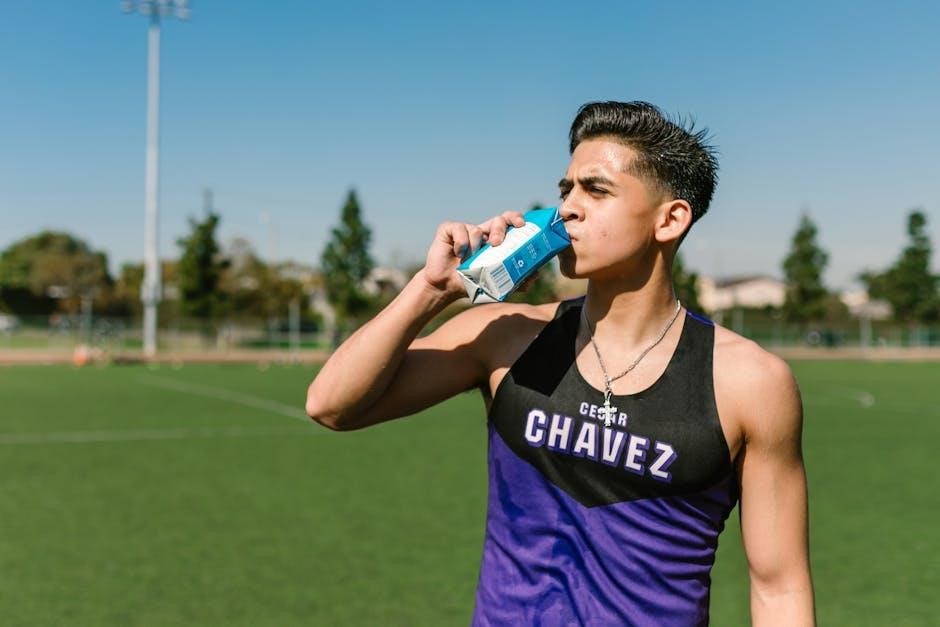The 7 Habits of Highly Effective Teens by Sean Covey is a self-help guide tailored for teenagers, offering practical advice on improving self-image, building relationships, and achieving personal goals. Based on his father’s renowned principles, this book provides a roadmap for teens to navigate life’s challenges with confidence and effectiveness.

Habit 1: Be Proactive
Habit 1, Be Proactive, is the foundation of The 7 Habits of Highly Effective Teens. It emphasizes taking responsibility for one’s life and choices, rather than blaming circumstances or others; Sean Covey explains that proactive individuals focus on things they can control, such as their attitudes and actions, rather than reacting to things they cannot control. This habit encourages teens to stop blaming external factors like weather, parents, or friends for their problems and instead take initiative to improve their situations.
- Proactive behavior involves making choices that align with personal values and goals.
- It’s about being solution-oriented rather than problem-focused.
- Teens are encouraged to develop a growth mindset, believing they can influence positive outcomes.
By adopting this habit, teens learn to stop waiting for life to happen and instead take charge of their lives. For example, instead of complaining about homework, a proactive teen would focus on completing it efficiently. This mindset helps build confidence, resilience, and self-discipline, laying a strong foundation for the other habits.
As Sean Covey puts it, being proactive is about realizing that “your life is your responsibility.” This empowering message helps teens understand that they have the power to shape their own success and happiness.

Habit 2: Begin with the End in Mind
Habit 2, Begin with the End in Mind, teaches teens to establish a clear vision for their lives and prioritize actions that align with their long-term goals. Sean Covey emphasizes the importance of setting personal mission statements to guide decision-making and focus on what truly matters. This habit helps teens avoid getting distracted by less important tasks and instead concentrate on activities that contribute to their personal growth and future success.
- It encourages teens to think deeply about their values, beliefs, and aspirations.
- A personal mission statement serves as a roadmap, helping teens stay focused on their goals.
- By prioritizing meaningful activities, teens can avoid wasting time on unimportant things.
This habit empowers teens to take control of their future by being intentional about how they spend their time. For instance, instead of reacting to daily events without a plan, a teen who begins with the end in mind will make choices that align with their goals, such as studying for exams or nurturing meaningful relationships. Sean Covey stresses that having a clear vision helps teens stay grounded and motivated, even when faced with challenges or distractions.
Ultimately, Habit 2 is about living purposefully and ensuring that daily actions reflect long-term aspirations. By starting with the end in mind, teens can create a life of significance and fulfillment.
Habit 3: Put First Things First

Habit 3, Put First Things First, focuses on effective time management and prioritization. Sean Covey emphasizes the importance of organizing tasks based on importance and urgency, helping teens avoid procrastination and focus on what truly matters. This habit encourages teens to take control of their time rather than being controlled by it.
- It introduces the concept of a “time management matrix” to categorize tasks into four quadrants: urgent and important, important but not urgent, urgent but not important, and neither urgent nor important.
- Teens are advised to prioritize tasks in the “important but not urgent” quadrant, such as building relationships, planning for the future, or personal growth.
- By focusing on these tasks, teens can reduce stress and achieve long-term success.
Covey stresses that proactive time management is key to balancing school, family, friends, and personal goals. For example, completing homework before watching TV or attending to family responsibilities ensures that teens make progress toward their goals without last-minute pressure. This habit helps teens develop self-discipline and a sense of accountability, enabling them to feel more in control of their lives. By prioritizing what truly matters, teens can create a balanced and fulfilling lifestyle.
Habit 4: Think Win-Win
Habit 4, Think Win-Win, teaches teens the value of mutually beneficial relationships and collaboration. Sean Covey emphasizes the importance of seeking solutions where everyone involved feels valued and satisfied. This habit encourages teens to adopt a mindset of fairness, respect, and shared success.
- Covey argues that a win-win approach fosters stronger friendships, better family relationships, and greater teamwork, helping teens build trust and credibility.
- He suggests that instead of focusing solely on personal gains, teens should consider the needs and feelings of others, leading to more harmonious interactions.
- For example, in group projects, teens can collaborate to ensure everyone contributes and benefits, rather than competing or allowing one person to do all the work.
By practicing empathy and cooperation, teens can create positive outcomes in both personal and academic settings. This habit helps them understand that success is not just about achieving their own goals but also about helping others achieve theirs. Thinking win-win promotes a culture of support and mutual respect, enabling teens to build lasting relationships and a stronger sense of community. This mindset is essential for long-term happiness and effectiveness in all areas of life.
Habit 5: Seek First to Understand, Then to be Understood
Habit 5 focuses on the importance of empathy and effective communication. Sean Covey emphasizes that understanding others is a cornerstone of strong relationships and personal effectiveness. Teens are encouraged to listen deeply and seek to understand others’ perspectives before expressing their own. This habit helps break down barriers of misunderstandings and fosters connection.
- Covey highlights that active listening is key to this habit. Teens are urged to ask questions, show genuine interest, and avoid interrupting or planning their response while others speak.
- This habit also promotes emotional intelligence, helping teens navigate conflicts and build trust with family, friends, and peers.
- By seeking to understand first, teens can address issues like misunderstandings, peer pressure, or social media conflicts more effectively.
Practicing this habit enables teens to communicate more effectively, resolve disagreements, and foster deeper, more meaningful connections. It teaches them that understanding others is not just about hearing words but about grasping their feelings and viewpoints. This mindset is crucial for building strong relationships and achieving personal and social success.

Habit 6: Synergize
Habit 6, Synergize, focuses on the power of collaboration and teamwork. Sean Covey explains that synergy is the idea of working together to achieve something greater than what could be accomplished alone. This habit encourages teens to value diversity, respect differing opinions, and combine their strengths to find innovative solutions.
- Covey emphasizes that synergy is not just about compromise but about creating something better together. Teens are urged to embrace teamwork and open communication.
- This habit is particularly relevant in group projects, sports, and social interactions, where collaboration can lead to better outcomes.
- By synergizing, teens learn to appreciate the unique perspectives and skills of others, fostering stronger relationships and mutual respect.
Synergy teaches teens that 1 + 1 can equal 3 or more when people work together creatively. It helps them overcome challenges, resolve conflicts, and achieve shared goals more effectively. This habit promotes a mindset of collaboration, enabling teens to thrive in both personal and team-based environments.

Habit 7: Sharpen the Saw
Habit 7, Sharpen the Saw, focuses on self-care and personal renewal. Sean Covey emphasizes the importance of balancing and maintaining one’s physical, emotional, social, mental, and spiritual well-being. This habit encourages teens to take time to recharge and prioritize their health.
- Covey suggests that just as a saw becomes dull without sharpening, individuals become less effective without self-care.
- Teens are advised to engage in activities that promote relaxation, exercise, and reflection, such as sports, meditation, or journaling.
- Neglecting self-care can lead to burnout and decreased effectiveness in other areas of life.
- By regularly “sharpening the saw,” teens can improve their resilience, focus, and overall quality of life.
This habit reminds teens that taking care of themselves is not selfish but necessary to achieve their goals and maintain long-term success. By prioritizing self-care, teens can sustain the energy and motivation needed to apply the other six habits effectively.
Implementing the Habits in Daily Life
Implementing The 7 Habits of Highly Effective Teens in daily life requires consistent effort and self-discipline. Sean Covey provides practical strategies to help teens integrate these habits into their routines. For example, teens can start by identifying one habit to focus on at a time, gradually building a strong foundation.
- Covey encourages teens to create a personal plan, setting small, achievable goals to apply each habit.
- Tools like journals, planners, and reminders can help track progress and stay accountable.
- Practicing self-reflection through activities like journaling or meditation can enhance self-awareness, a key component of these habits.
- Surrounding oneself with supportive friends and family who encourage positive behavior can also aid in sustaining these habits.
By consistently applying the habits, teens can develop a mindset that fosters growth, responsibility, and effectiveness. Over time, these practices become second nature, leading to improved relationships, academic success, and personal fulfillment. Covey emphasizes that small, consistent efforts can lead to significant long-term changes, empowering teens to take control of their lives and achieve their full potential.

The Impact and Legacy of the Book
The 7 Habits of Highly Effective Teens has left an indelible mark on millions of lives since its publication in 1998. With over 3 million copies sold and a 90% approval rating from teens and parents, it has become a go-to guide for navigating adolescence. The book’s relatable advice, practical strategies, and engaging style have made it a timeless resource for personal growth.
Sean Covey’s adaptation of his father’s principles for a younger audience has resonated globally, addressing modern challenges like social media and cyberbullying. Its legacy lies in empowering teens to take control of their lives, fostering self-discipline and confidence.
The book’s influence extends beyond individual readers, impacting families, schools, and communities. Many educators and parents credit it with helping teens build resilience and achieve their goals. Its enduring popularity is a testament to its relevance in a rapidly changing world.
Today, The 7 Habits of Highly Effective Teens remains a cornerstone of self-help literature, inspiring new generations to embrace habits that lead to success and fulfillment.
The 7 Habits of Highly Effective Teens by Sean Covey has proven to be a transformative guide for millions of teenagers worldwide. By adapting the timeless principles from his father’s work, Covey created a relatable and practical roadmap for navigating the challenges of adolescence. The book’s focus on personal responsibility, self-discipline, and proactive behavior has empowered teens to take control of their lives and build a strong foundation for future success.
Its engaging style, filled with real-life examples, stories, and motivational quotes, has made it accessible and inspiring for young readers. The habits outlined in the book—such as being proactive, beginning with the end in mind, and seeking to understand—have become essential tools for teens to improve their self-image, relationships, and goal-achieving abilities.
With over 3 million copies sold and widespread acclaim, The 7 Habits of Highly Effective Teens has left a lasting legacy as a go-to resource for personal growth and development. Its impact continues to resonate, helping teens thrive in an ever-changing world and equipping them with the skills to become their best selves.
